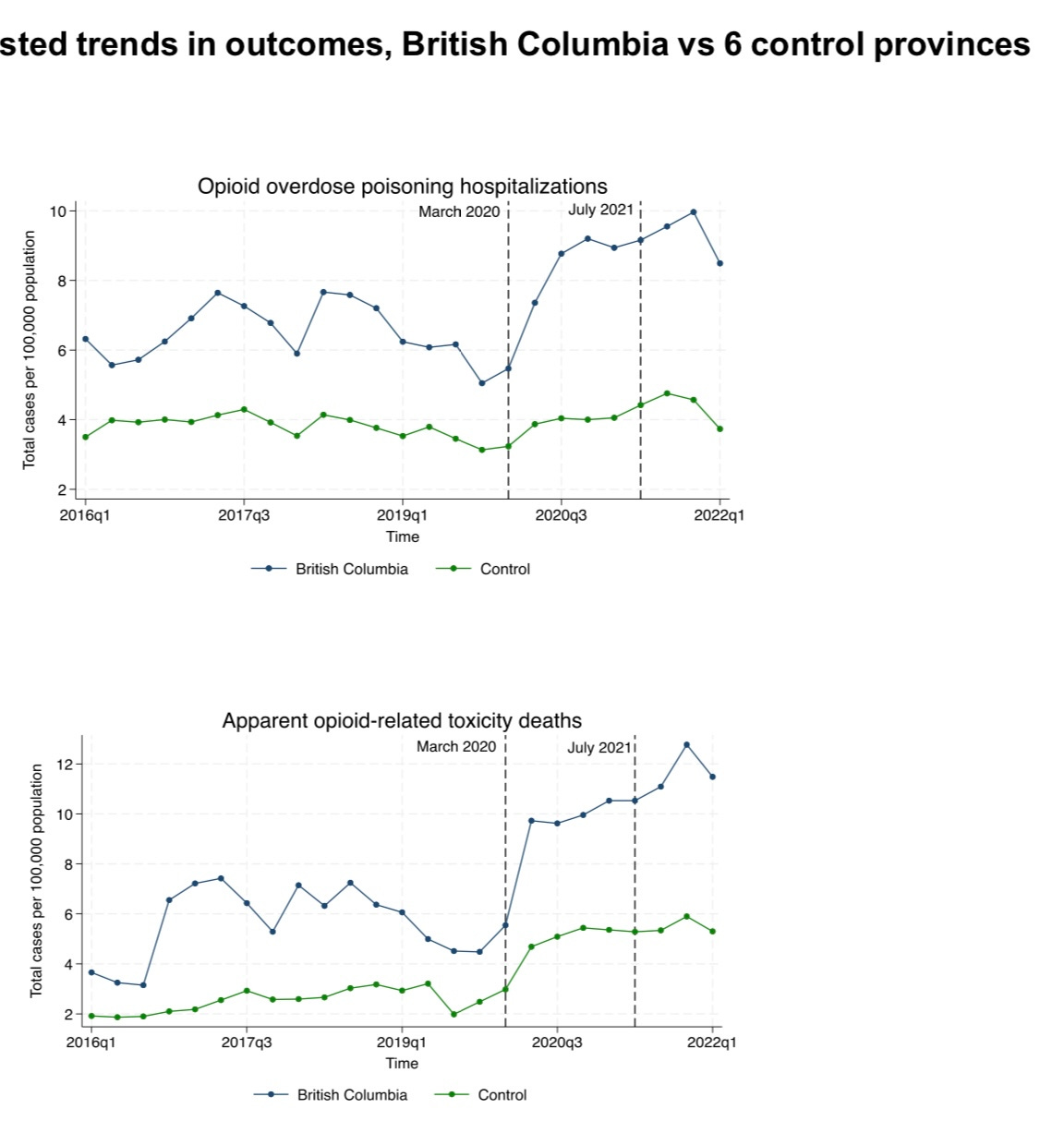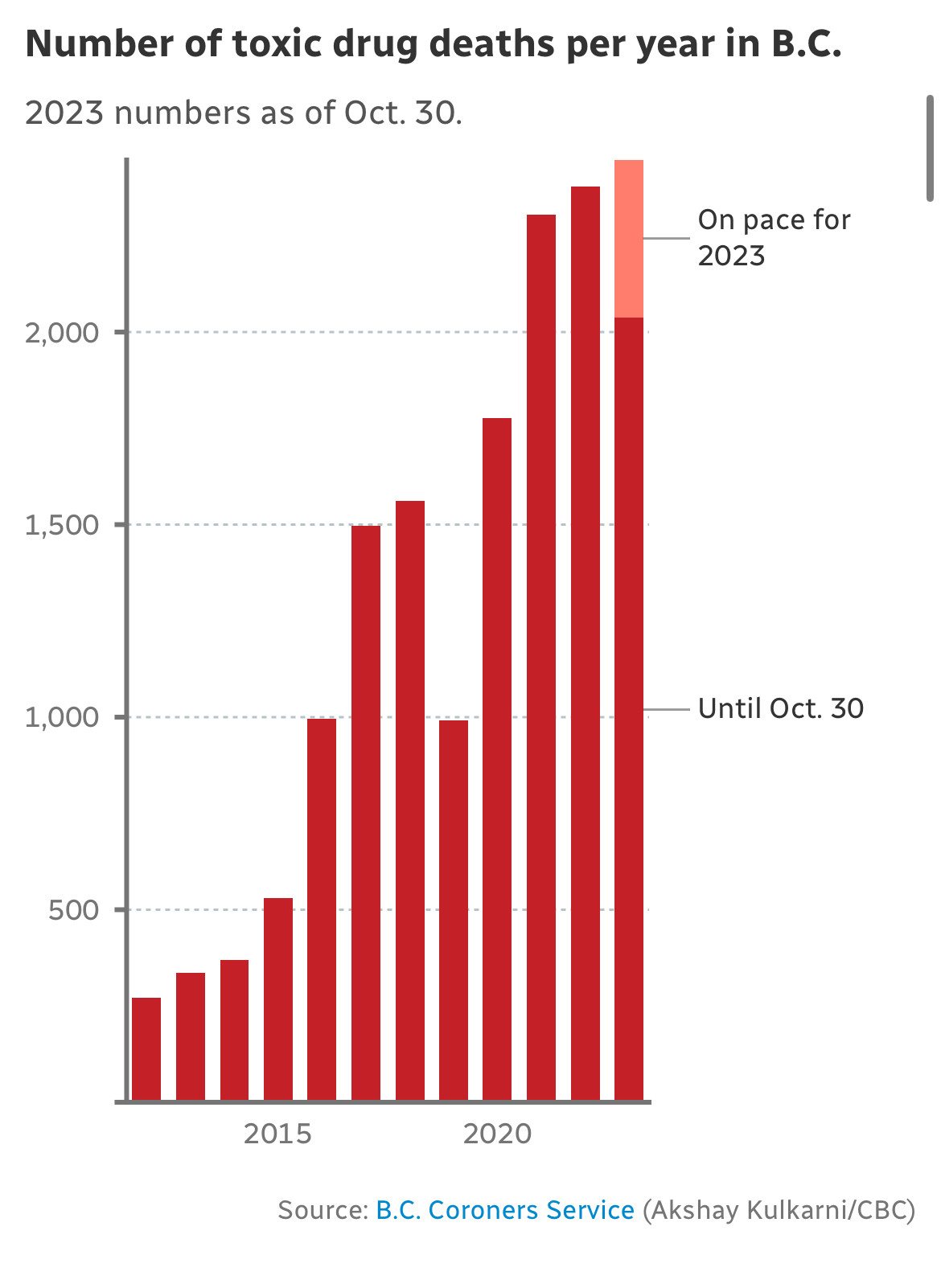Guest Post by Alex Berenson
Four years ago, the Canadian province of British Columbia gave addicts legal access to fentanyl and other opioids, hoping to reduce hospitalizations and deaths. The results have been catastrophic.
In 2020, the Canadian province of British Columbia took a big step towards drug legalization, letting addicts have medical prescriptions for opioids, including fentanyl.
British Columbia’s “Safer Opioid Supply” program included lenient rules to encourage users to join. Doctors could write prescriptions even for people at high risk of overdose. Addicts did not have to enter treatment or even agree to counseling to participate. Canada’s national health insurance program even paid for the drugs.
As Canada says in its official webpage on “safer supply” programs:
[They] do not necessarily focus on stopping drug use. Instead, they focus on meeting the existing needs of people who use drugs.
With the program, British Columbia – which includes Vancouver, a city drug legalization advocates often tout as a model – became the first state or province anywhere to allow widespread medical opioid prescriptions for addicts.
But, like British Columbia’s earlier efforts at what advocates like to call “harm reduction,” the plan has failed catastrophically, a new study shows.
In a report Jan. 16 in JAMA Internal Medicine, Canadian researchers found opioid overdose hospitalizations and deaths have soared in British Columbia since 2020.
The rise occurred both in absolute numbers and compared to other Canadian provinces that did not legalize opioid prescriptions.
The researchers first compared British Columbia to two small nearby provinces. But they found similar results when they checked bigger provinces too, including Ontario, Canada’s largest.
—
(Oh, Canada. The program began in March 2020 and was expanded in July 2021. In both graphs, the blue line shows overdoses in British Columbia, and the green a group of “control provinces” did not legalize opioid prescriptions for addicts.)

—
For hospitalizations, the rising gap between British Columbia and the other provinces reached statistical significance, meaning the change probably was not due to chance.
Overdose deaths also jumped faster in British Columbia than elsewhere in Canada. In 2018 and 2019, the province had about 1,200 opioid deaths a year. The rest of Canada had about 2,800.
By 2022, deaths in British Columbia had risen roughly 100 percent, to 2,400. In the rest of Canada, deaths rose about 80 percent to 5,100. However, that difference did not reach statistical significance, meaning it could have been due to chance.
Those numbers are more horrific than they seem, because British Columbia is relatively small by American standards. With 5 million people, it would rank as the 25th most-populated American state, just behind Alabama.
The 7,200 opioid overdose deaths British Columbia suffered from 2021 through 2023 are thus suffered the equivalent of about 475,000 deaths in the United States. And the figure does not include overdoses from cocaine or other drugs like Valium.
Put another way, people in British Columbia are dying from opioid overdose at roughly double the rate in the United States, where overdoses are rightly viewed as a national emergency. If British Columbia were a state, it would have the second-highest rate of opioid overdose deaths, behind only West Virginia.
—
What legalization advocates should find particularly disturbing about the catastrophe in British Columbia is that the province represents a test case for the strategies they want to pursue worldwide.
For over a decade, British Columbia and Vancouver have taken a very permissive stance on opioid use. Local and provincial governments have focused their energies on “harm reduction” – the view use cannot be stopped and that efforts to discourage or stigmatize it, much less punish it as criminal activity, only increase its risks.
The city and province have aggressively promoted the use of naloxone to revive people who suffered overdoses. They make “medically assisted treatment” – which basically means encouraging addicts to use less dangerous opioids rather than trying to quit – widely available. They have “supervised consumption sites,” where people can smoke or inject drugs while a nurse watches. Last year, the province even gave public money to a group called the Drug User Liberation Front, which then bought cocaine, methamphetamine, and heroin, to give to users.
In his book Chasing The Scream, which was published in January 2015 and has become the modern bible of drug legalization advocacy, the British journalist Johann Hari lauded Vancouver for the way it supported supposedly safe use of drugs.
After a year and a half of meeting victims of this war and feeling more and more angry and depressed, Vancouver had given me an itchy sense of hope. I had learned… that things could get dramatically better if people organized and demanded it.
The result of all of those efforts? In 2014, British Columbia had 366 opioid overdose deaths.
Last year, it had almost 2500.
—
(Progress as promised)

—
Vancouver’s health bureaucrats have come up with one effective response to the crisis.
They don’t use the word “overdose” anymore.
In a masterpiece of Orwellian euphemism, they refer to “poisoning” deaths from “toxic” and “unregulated” drugs, as if “regulated” fentanyl cannot kill, as if the explosive growth in medically prescribed opioids in the United States and Canada two decades ago did not set the stage for the mountains of human misery ever since.
In the short run – the very short run – harm reduction programs may save users from overdoses and death, though even in that case the evidence is not as clear as drug advocates pretend.
Notably, in a 2018 paper, two well-regarded social scientists found that broadening access to naloxone “led to more opioid-related emergency room visits and more opioid-related theft, with no net measurable reduction in opioid-related mortality.” As the researchers wrote later for the Brookings Institution, when users are aware naloxone is available, they may use more and more potent opioids.
But the paper – like other efforts to detail the potential real-world costs of making drugs more accessible or more socially acceptable – generated huge pushback among the legalization community.
Because for drug advocates, the answer to the failures of “harm reduction” is always more of the same. About 12 months ago, British Columbia fully decriminalized the possession and use of heroin, cocaine, and fentanyl.
But with death rates continuing to rise, advocates argued last fall addicts be allowed to receive drugs without a prescription – a proposal that essentially would end any restrictions on state-funded drug use. (The government rejected the proposal.)

—
What no one in the harm reduction community will admit is that societies can control drug use. They can’t eliminate it entirely, but they can make it more or less acceptable by highlighting its harms and making users legally responsible. Rates of drunk driving and tobacco smoking have plunged in the United States, thanks to stigmatization, increased taxes, and police enforcement against impaired drivers.
Meanwhile, British Columbia has gone so far the other way that users have an actual union of sorts, the Vancouver Area Network of Drug Users.
But every effort at harm reduction – even if well-intentioned – sends the opposite message, that the danger of opioids and cocaine can be managed and are not inherent to the substances themselves.
British Columbia’s experience proves the opposite.
How many deaths will it take for the harm reducers to admit the truth?
It is my sincere desire to provide readers of this site with the best unbiased information available, and a forum where it can be discussed openly, as our Founders intended. But it is not easy nor inexpensive to do so, especially when those who wish to prevent us from making the truth known, attack us without mercy on all fronts on a daily basis. So each time you visit the site, I would ask that you consider the value that you receive and have received from The Burning Platform and the community of which you are a vital part. I can't do it all alone, and I need your help and support to keep it alive. Please consider contributing an amount commensurate to the value that you receive from this site and community, or even by becoming a sustaining supporter through periodic contributions. [Burning Platform LLC - PO Box 1520 Kulpsville, PA 19443] or Paypal
-----------------------------------------------------
To donate via Stripe, click here.
-----------------------------------------------------
Use promo code ILMF2, and save up to 66% on all MyPillow purchases. (The Burning Platform benefits when you use this promo code.)






“The results have been catastrophic.”
That’s how you know it’s working.
Yup.
At this stage, Canada is doing everything they can to exterminate
-whites;
-conservatives;
-sick people;
-the elderly;
-freedom of speech;
-freedom of assembly;
-affordable anything;
-their history;
-common sense;
-the expectations and hopes of non-Canadians
Francis Marion…wherefore are thou, brother?
Check in w/ Admin, if you see this and get the chance.
Firefighter #1: I don’t understand it, the more gasoline we put on the fire, the more it burns.
Firefighter #2: That’s weird, it says right here in the manual, fight fire with fire. Moar gas!!!
Here in british communista all is going according to plans comrades. No cause for concern.
is…. they don’t give a shyte and are laughing their asses off. People here are just as stupid as elsewhere in the ‘west’.
Junkies dying is catastrophic? I say give them all they want and be done with it, better than supporting their worthless asses on welfare or paying for their multitude of self-inflicted health issues forever.
Same for alcoholics, over eaters and aggressive drivers too.
Kill everyone who consumes more than their fair share or behaves like a jackass on the roads.
And who is to decide, jackass.
Right? All of this has been engineered. Direct rage and derision at the architects.
Sadly many don’t either see this or refuse to acknowledge the issue. Blame the drug addicts, invading immigrants etc for taking advantage of the free offerings by the criminals.
Its always the same… kill the addicts, kill the people coming across the river, kill’m all. And the ones facilitating, robbing the People to pay other criminals to import limitless ‘immigrants’…. get a pass.
When its not safe for these dirtball traitorous politicals and billionaires to move about is when any of this evil starts to stop. Until then, its turn the channel to the sportsball playoffs and yammer about the political pantomime being played out.
We can all vote moar harder just for shits and giggles.
Notice 2015 is the year Castro Jr. was selected as poster puppet for the UN/WEF take over of Canuckistan. The misnomered Liberal party’s motto is “subsidize failure to produce more of it”.